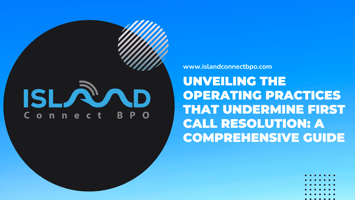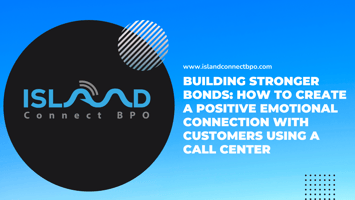At Island Connect, we believe in more than just transactions; we believe in building relationships....
"Mastering the Art of Communication: Key Techniques for Call Center Agents"
Take the wheel and become the captain of your success!
In the dynamic realm of call centers, effective communication serves as the cornerstone of success. As the frontline warriors of customer service, call center agents wield the power of communication to forge meaningful connections, resolve issues, and elevate the customer experience. In this blog, we'll delve into key techniques that call center agents can master to enhance their communication prowess and steer the ship towards success.
Active Listening
- At the heart of effective communication lies active listening – the art of truly hearing and understanding the customer's needs. Call center agents must hone their ability to pay full attention to customers, refrain from interruptions, and respond with genuine empathy. By demonstrating a willingness to understand, agents can foster trust and build rapport with customers, laying the foundation for fruitful interactions.
- Clear and Concise Language: In the fast-paced world of call centers, clarity is paramount. Agents should strive to communicate with simplicity, eschewing jargon and technical language that may confuse customers. By using clear, concise, and articulate language, agents ensure that information is easily understood, thereby minimizing misunderstandings and streamlining the resolution process.
Tone and Pitch:
- Voice modulation is a powerful tool in the arsenal of communication. Agents should cultivate a friendly, professional tone and adjust their pitch and volume to suit the situation. Whether offering reassurance to a worried customer or conveying authority during a resolution, mastering tone and pitch enhances the overall customer experience and fosters a sense of trust and confidence.
Use of Empathy and Positive Language:
- Empathy is the bridge that connects agents to customers on an emotional level. By demonstrating empathy and using positive language, agents can de-escalate tense situations, alleviate customer frustration, and instill a sense of reassurance and support. Empathy humanizes the interaction, transforming a transactional exchange into a genuine connection.
Structured Conversation:
- A structured approach to conversations ensures that no stone is left unturned. Techniques like the "Greeting, Problem, Solution, Ending" (GPSE) framework provide agents with a roadmap to navigate conversations efficiently and effectively. By following a structured approach, agents can gather pertinent information, address customer concerns methodically, and ensure a seamless resolution process.
- Restating customer concerns in one's own words not only clarifies information but also demonstrates active engagement and understanding. By paraphrasing, agents show customers that their concerns are being heard and validated, fostering a sense of trust and confidence in the resolution process.
Active Problem Solving: Handling Difficult Customers
- Proactivity is key to effective communication. Agents should take a proactive approach to problem-solving by identifying potential solutions or alternatives to customer issues. By offering proactive assistance and guiding customers towards resolution, agents showcase their commitment to delivering exceptional service and exceeding customer expectations.
- In the face of customer dissatisfaction, agents must remain composed and solution-oriented. Techniques such as the "LEAP" method (Listen, Empathize, Apologize, Propose a Solution) provide a roadmap for diffusing tense situations and reaching mutually satisfactory resolutions. By approaching conflicts with patience, empathy, and professionalism, agents can turn challenges into opportunities for customer delight.
Professional and Personal Development:
- Continuous learning and development are essential for honing communication skills. Managers should provide regular training and coaching sessions, offering constructive feedback and guidance to help agents refine their techniques. By investing in professional and personal development, agents can continuously improve their communication skills, elevate their performance, and contribute to the overall success of the call center.
In the ever-evolving landscape of call centers, mastering the art of communication is a non-negotiable skill for agents. By implementing key techniques such as active listening, clear and concise language, tone and pitch modulation, empathy, structured conversation, paraphrasing, active problem-solving, conflict resolution, and ongoing professional development, agents can enhance their communication prowess, provide exceptional customer service, and propel the call center towards success. So, let's set sail on the journey to communication mastery and chart a course towards excellence!



